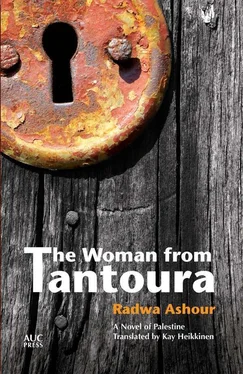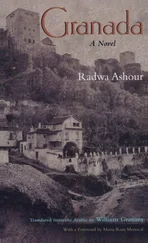I asked Amin, “Did you quarrel?”
“We differed. I said that he was stupid. He’ll regret his decision when he finds that the guys he surpassed in school have become engineers and doctors and men of law, that some of them have gotten their doctorates and become university professors, and he’s marking time, a high school teacher for the aid agency. He didn’t like what I said. He was annoyed.”
“I think he doesn’t want to leave his parents.”
“That’s foolish. I left my parents to study before I was thirteen years old.”
“It’s different. He feels he’s responsible for them.”
“I’m responsible, I’m the oldest. I won’t fail them. I’ll ask them to move in with us.”
“I believe that Ezz wants to marry.”
“Did he tell you that?”
“He didn’t tell me but I know that he loves a girl in the camp. He wants to marry her.”
“Has he introduced her to us?”
I laughed. “She’s the only one he hasn’t brought to visit us or to visit my uncle’s house.”
“How did you find out?”
“He told me.”
“He didn’t tell me!”
“She’s from Saffurya.”
“Have you seen her?”
“I’ve seen her.”
Amin moved his left hand, spreading out his fingers like a fan. “How?”
I told Amin about the girl. I described her and told him what I knew of her family.
There was no doubt about Ezz’s wish to marry this girl. I think it was one reason for his inclination not to accept the scholarship, and he may have wanted the job for the salary. He worked in the summers and sometimes during the school year, claiming that he did so because he loved the work, or because So-and-So embarrassed him and he could not refuse his request; but I knew that the financial situation in the family was not the best. My uncle had been forced to sell two of his boats and only one remained; and the house was always open and my uncle was generous as always, never refusing a request from someone in need. Neither Ezz nor my uncle Abu Amin spoke about it, but I deduced it from what my aunt said and alerted Amin. He was embarrassed to speak with his father, but he offered to give Ezz part of his salary regularly, every month. Ezz refused, saying, “You have a wife and son, and Ruqayya is pregnant. Our Lord has been gracious and blessed us, and we lack for nothing.” He said that and assured us it was true. But now, as he asserted that he preferred to work, I thought to myself that certainly all this was one reason, and maybe the primary reason and not the secondary one, for his refusal to continue his study.
Ezz began his new work in the aid agency on the first of October, and on the 29th Israeli forces occupied Gaza and the Tripartite Aggression against Egypt began. Sidon blazed with demonstrations; I was following the news and reactions in Lebanon from my bed, as I had given birth to Hasan. I remember that I was carrying an infant of less than three months in my arms when my uncle announced that he was going to Egypt.
My aunt asked in amazement, “Why Egypt?”
He looked at her, disliking the question: “Because it’s Egypt!”
My aunt said, raising difficulties, “If my sister Zeinab were with us, she would say, ‘Take me with you so we can look for the boys.’” She sighed. “God have mercy on her and compensate her for her patience. For sure she’s living with them in Paradise now.”
The words escaped me: “Wouldn’t it have been better for him to have mercy on her during her life, and leave her at least one of the three!”
“Better, Ruqayya? He has his wisdom that his servants cannot fathom. Say rather, ‘Thank God, the only one we thank in adversity.’”
I said nothing.
My uncle went by sea to Port Said, and returned after three weeks, receiving the people who flocked to him as if he were returning from the Hajj. He presided over the room and told his story: “I visited Port Said and Port Fouad and Port Tawfiq and Ismailiya and Suez, and of course, Cairo.” He said, “I saw the Canal and swam in its waters.” He said, “I took the train to Cairo and attended a concert by Umm Kulthum. I went to the movies and before the show I saw a film called The Talking Newspaper , where I saw Abd al-Nasser as if he were standing before me in person, when he was speaking from the pulpit of al-Azhar Mosque and people were shouting for him, and then when they were carrying him in his car. And I saw the planes when they were bombing Port Said.” He would say, “I asked about the neighborhood where Abd al-Nasser lived, and I walked in it.” One of the young men asked him, “Why didn’t you ask to meet him?” My uncle said, his face a little red, “Cairo is big, I didn’t know who to contact to take me to him. And anyway he’s busy, and those who love him are many — imagine if everyone who loves him asked to visit him, would he attend to the visitors or concentrate his efforts on running the country?”
Two months after my uncle’s return, Ezz confided in me that his father had sold half the boat to cover the cost of his trip to Egypt. “He didn’t tell me. If I had known I would have managed it for him. I can borrow the money and then return it, since I’m employed and have an income. But he didn’t tell me.” Ezz laughed, long and loud, and said, “Well done, Abu Amin! Always acting like a king!” I laughed too.
12
Enter the Girl from Saffurya
My uncle looked at himself in the mirror one last time. He raised his hand to the cords of his headdress as if he were going to adjust it a little on his head, and then lowered his hand without touching it. Ezz laughed and commented on his father’s concern for his appearance, “They’ll think you are the groom, Abu Amin!”
His father answered, smiling, “They should. I’ve never seen a groom like you going to propose like that, with no kufiyeh or cords, not even a jacket — a shirt and pants, as if you were one of the railway workers in Haifa.”
“It’s hot out.”
“But you’re the groom. Wear a suit and they’ll respect you.”
“Let’s leave the respect to the army and the Second Bureau.”
Sadiq clung to his father and insisted on going out with him. I refused and he cried. His grandfather said, “Let’s go, Sadiq.” He took his hand and headed for the door, followed by Amin and Ezz. I stayed at home with my aunt and Hasan. My aunt began to ask me about the bride for the tenth or twentieth time, her hair, her height and weight, where she was from, all the details.
“Are her eyelashes long?”
“She’s pretty, Aunt, her eyelashes are long and her eyes are deep black. She’s light-hearted and charming.”
“Is her voice loud enough and does she speak distinctly, or is she like the neighbors’ daughter, who speaks fast in a low voice? I can’t understand her.”
“She speaks clearly, Aunt.”
“How many sisters did you say she has?”
“Six sisters.”
“All their children are girls, God save us. What will Ezz do with a wife with six sisters? God help him!”
She was silent for a few minutes, withdrawn, as if she were thinking over the description of the daughter-in-law she had yet to see. Then she returned to her questions, “How far is Saffurya from our town?”
“I don’t know.”
“Is it in the Haifa region?”
“No, near Nazareth.”
“When they took over the town, did they take them out?”
“They besieged the town and then they struck from the air.”
“They fled?”
“They left on foot for Lebanon. They got to Rumaysh and lived with people they knew. Some months later they went back.”
“They went back to their town? What forced them out to Lebanon a second time?”
“They caught them before they got to Saffurya and considered them infiltrators. They put them in prison in Nazareth and then loaded them into trucks and threw them over the border.”
Читать дальше












